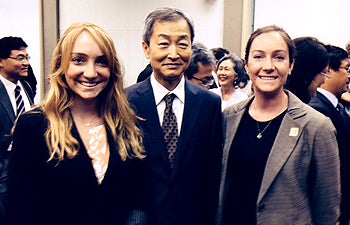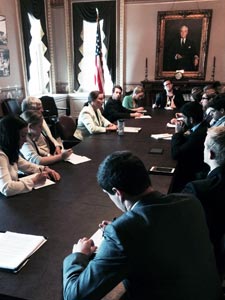Avoiding Mass Destruction
Attending a meeting at the Pentagon, students visited the 9/11 memorial where they stood in reverential silence as they read the names of the fallen.
Then, at a Pentagon briefing with cyber security and missile defense experts, international relations major Alexandra Axtell learned the chief of staff for cyber security had previously been a fighter jet pilot. Axtell, an aspiring naval aviator and ROTC member, was thrilled when he spoke to her after the briefing.
“We spoke for 45 minutes, but it flew by,” she said. “He encouraged me as a previous humanities major to be confident in my skills when it comes time to put my knowledge to the test at flight school. That conversation deeply impacted my life and is one I will remember forever.”
Axtell was among 15 undergraduates participating in the Problems Without Passports (PWP) course “U.S. Defense and Foreign Policy Nonproliferation and Weapons of Mass Destruction.” Led by USC Dornsife Professor Emeritus of the Practice of International Relations Wayne Glass, the students traveled to Washington, D.C., this summer to meet senior government and other experts on the issue.
In the wake of September 11, 2001, fear of annihilation by weapons of mass destruction (WMD) has replaced the Cold War threat. During the past decade, United States foreign policy and programs have focused increasingly on preventing the spread of chemical, biological, nuclear and radiological weapons.
A collection of international treaties and cooperative agreements constitute the “nonproliferation regime,” which guides and governs policies and programs of the U.S. and other participating nations. Some experts believe that the regime is teetering on the brink of collapse, leaving the world facing an unrestrained international proliferation of WMD.

Undergraduates and sisters Kayleigh Axtell (left) and Alexandra Axtell met South Korea Ambassador to the United States Ho Young Ahn while in the nation’s capital.
Examining the principle elements of today’s international cooperative efforts to prevent the proliferation of WMD, the course asked students to consider the strengths and weaknesses of those cooperative efforts.
Glass himself remains optimistic.
“The nonproliferation regime is not as sturdy and robust as many of us would like it to be, but we’re a long way from what we could qualify as a collapse,” he said. Glass noted that positive negotiations with Iran over its nuclear program and international cooperation in ridding Syria of chemical weapons are highly encouraging.
Designed to familiarize students with major international and U.S. nonproliferation policy and program issues, the PWP course helps students understand the structure and process of the various U.S. government components involved.
It also serves to introduce students to the thousands of career options that exist within the realm of public policy, particularly foreign policy and international relations, in Washington, D.C.
During the six-week course, in what Glass described as “a jam-packed curriculum,” students met more than 50 experts and officials and attended round tables and seminars on nuclear security topics with non-governmental, executive and legislative branch representatives.
“Dr. Glass took us to meet contacts in every noteworthy organization in Washington, D.C., and ensured we walked away with a better understanding of the subject material as well as business cards that represented new connections made to build ourselves a better future,” Axtell said.
“I shook the hand of an Oregon senator, stood on the steps of the Lincoln Memorial, sat in the meeting rooms of the Senate and White House, and had one-on-one conversations with the WMD elites of not only D.C., but the entire country.
“I joined afraid I wouldn’t be able to hold an intelligent conversation about arms races and nuclear breaking points but left empowered by the irreplaceable experience I gained through the PWP DC program.”
Students visited the White House where they had a private audience with Laura Holgate, senior director, WMD Terrorism and Threat Reduction at the National Security Council.

At the White House students had a private audience with Laura Holgate, senior director of WMD Terrorism and Threat Reduction at the National Security Council. From left, Alexandra Axtell; Kayla Foster; Wayne Glass, Professor Emeritus of the Practice of International Relations; Holgate; Aaron Rifkind; Kayleigh Axtell; Peter Hughes; Ara Ellison; Emily Kennelly; Leigh Jasobson; John Caton; Keith Agarwal; Kshitij Kumar; Ian Beck and Jason Finkelstein.
They also visited the Defense Threat Reduction Agency at the Department of Defense, had a private meeting with Oregon Sen. Jeff Merkley (Dem.) and visited CIA headquarters.
“It was quite thrilling to arrive at the CIA’s suburban complex, go though security and then find ourselves in the entrance room you would see in movies and on TV with the United States seal embedded in the floor,” said Jason Finkelstein, a senior majoring in international relations and Russian.
“We had a very productive meeting with two young CIA officers about national intelligence estimates, which are the key intelligence findings on some security issues,” Glass said. “We learned how those are written, organized and managed.”
Nor was the trip all work and no play.
Former course participant and alumna Margarita McFadden, who graduated from USC Dornsife in 2012 with a bachelor’s degree in international relations, invited this year’s PWP participants to a gala event at the Kennedy Center hosted by Vital Voices Global Partnership, a nonprofit women’s empowerment organization established in 1997 by then-First Lady Hillary Clinton and then-Secretary of State Madeleine Albright.
“Hillary Clinton was the MC at this inspirational event to honor women worldwide who had made special contributions,” Glass said. “We heard some compelling stories of Third World women who reached out to help dispossessed women.”
Students also attended a baseball game, visited The Phillips Collection and attended a concert by the National Symphony Orchestra at the John F. Kennedy Center for the Performing Arts.
“For me, the highlight of the course was having access to such senior and influential figures who we normally only read or hear about on the news,” said Finkelstein, who spent the rest of his summer interning at the Bureau of European and Eurasian Affairs at the Department of State. “This insider perspective was invaluable.”
“Seeing the fulfilling career paths people have taken in public service was inspiring, and I hope to follow in some vein. The course is a wonderful opportunity because it’s given me so many insights and contacts that could help kickstart my job search.”